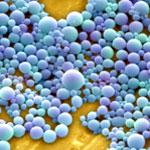Showing Spotlights 25 - 32 of 87 in category All (newest first):
 A group of experts from the chemical industry and various research laboratories in Germany have published a report on the current status of risk research on nanotechnology materials and applications. The report - 10 Years of Research: Risk Assessment, Human and Environmental Toxicology of Nanomaterials - provides an overview of the current state of risk assessment and toxicological research into nanomaterials. It also lists and summarizes the national and European projects on toxicology on various nanomaterials. In their report, the working group "Responsible Production and Use of Nanomaterials" has drawn up a list of topics and priorities which need to be addressed; activities and projects which have already been carried out; are currently on-going; or are still at the planning stage. The main focus of our considerations is on Germany, with a wider outlook on papers and results at European level.
A group of experts from the chemical industry and various research laboratories in Germany have published a report on the current status of risk research on nanotechnology materials and applications. The report - 10 Years of Research: Risk Assessment, Human and Environmental Toxicology of Nanomaterials - provides an overview of the current state of risk assessment and toxicological research into nanomaterials. It also lists and summarizes the national and European projects on toxicology on various nanomaterials. In their report, the working group "Responsible Production and Use of Nanomaterials" has drawn up a list of topics and priorities which need to be addressed; activities and projects which have already been carried out; are currently on-going; or are still at the planning stage. The main focus of our considerations is on Germany, with a wider outlook on papers and results at European level.
Feb 28th, 2012
 Back in the early 2010s, food nanotechnology seemed to be a very hot topic and large industrial food companies were eager to explore new opportunities offered by nanotechnology applications. Then, as critical voices from NGOs and regulators appeared, the food industry went into silent mode. But that doesn't mean that food nanotechnologies aren't being researched and developed in labs around the world. Here is an overview of what nanotechnology applications are currently being researched, tested and in some cases already applied in food technology. It appears that we are still some way from seeing "Frankenfoods" in supermarket shelves. According to a recent commentary by an FDA official, what's holding back the introduction of nanofoods is the hesitation of the food industry, fearing a public backlash along the lines of what happened wit genetically modified foods.
Back in the early 2010s, food nanotechnology seemed to be a very hot topic and large industrial food companies were eager to explore new opportunities offered by nanotechnology applications. Then, as critical voices from NGOs and regulators appeared, the food industry went into silent mode. But that doesn't mean that food nanotechnologies aren't being researched and developed in labs around the world. Here is an overview of what nanotechnology applications are currently being researched, tested and in some cases already applied in food technology. It appears that we are still some way from seeing "Frankenfoods" in supermarket shelves. According to a recent commentary by an FDA official, what's holding back the introduction of nanofoods is the hesitation of the food industry, fearing a public backlash along the lines of what happened wit genetically modified foods.
Feb 2nd, 2012
 Survey research indicates that religious belief will be a powerful influence in shaping public views about nanotechnology, while knowledge about nanotech will be less influential. And yet religious thought about nanotech has received little attention. We know that nanotechnology has evoked a large body of literature on moral and ethical issues, but almost all of this is expressed in secular voices, e.g., those of philosophers, ethicists, and scientists. Religious commentaries about nanotechnology have been much more rare. Now it is worth knowing what religious voices have said about nanotechnology, so that we might anticipate future religious reactions.
Survey research indicates that religious belief will be a powerful influence in shaping public views about nanotechnology, while knowledge about nanotech will be less influential. And yet religious thought about nanotech has received little attention. We know that nanotechnology has evoked a large body of literature on moral and ethical issues, but almost all of this is expressed in secular voices, e.g., those of philosophers, ethicists, and scientists. Religious commentaries about nanotechnology have been much more rare. Now it is worth knowing what religious voices have said about nanotechnology, so that we might anticipate future religious reactions.
Nov 16th, 2011
 Engineered nanomaterials present regulators with a conundrum - there is a gut feeling that these materials present a new regulatory challenge, yet the nature and resolution of this challenge remains elusive. But as the debate over the regulation of nanomaterials continues, there are worrying signs that discussions are being driven less by the science of how these materials might cause harm, and more by the politics of confusion and uncertainty. Yet the more we learn about how materials interact with biology, the less clear it becomes where the boundaries of this class of materials called "nanomaterials" lie, or even whether this is a legitimate class of material at all from a regulatory perspective.
Engineered nanomaterials present regulators with a conundrum - there is a gut feeling that these materials present a new regulatory challenge, yet the nature and resolution of this challenge remains elusive. But as the debate over the regulation of nanomaterials continues, there are worrying signs that discussions are being driven less by the science of how these materials might cause harm, and more by the politics of confusion and uncertainty. Yet the more we learn about how materials interact with biology, the less clear it becomes where the boundaries of this class of materials called "nanomaterials" lie, or even whether this is a legitimate class of material at all from a regulatory perspective.
Apr 15th, 2011
 Patterns of news coverage on nanotechnology are developing in ways that mirror issue cycles for previous technologies, including agricultural biotechnology. In particular, early coverage of nanotechnology was dominated by a general optimism about the scientific potential and economic impacts of this new technology. This is in part related to the fact that a sizeable proportion of nanotechnology news coverage - at least in newspapers - continues to be provided by a handful of science journalists and business writers. This is an initial draft of an article that what will eventually become a chapter on public attitudes toward nanotechnology in a new book on risk communication and public perception of nanotechnology. It's meant to be a current update and comprehensive overview of what we know (and don't know) at this point.
Patterns of news coverage on nanotechnology are developing in ways that mirror issue cycles for previous technologies, including agricultural biotechnology. In particular, early coverage of nanotechnology was dominated by a general optimism about the scientific potential and economic impacts of this new technology. This is in part related to the fact that a sizeable proportion of nanotechnology news coverage - at least in newspapers - continues to be provided by a handful of science journalists and business writers. This is an initial draft of an article that what will eventually become a chapter on public attitudes toward nanotechnology in a new book on risk communication and public perception of nanotechnology. It's meant to be a current update and comprehensive overview of what we know (and don't know) at this point.
Jan 24th, 2011
 Although the literature grows on the use of science to inform decisions on the environmental, health and safety implications of nanotechnology, little has been published by those who make such decisions. In a recent commentary in Nature Nanotechnology, officials of the US Environmental Protection Agency (EPA), the European Commission and the Organisation for Economic Co-operation and Development (OECD), discuss the types of decision facing government regulators, the new considerations nanotechnology brings to decision-making, the role of science in informing decisions, how regulators cooperate internationally on policy issues, and the challenges that lie ahead. The authors provide an overview of key reports and regulations and then discuss the complexity of issues with regard to addressing nanomaterials within the context of existing regulations and the need to weigh nanomaterial risk and benefits.
Although the literature grows on the use of science to inform decisions on the environmental, health and safety implications of nanotechnology, little has been published by those who make such decisions. In a recent commentary in Nature Nanotechnology, officials of the US Environmental Protection Agency (EPA), the European Commission and the Organisation for Economic Co-operation and Development (OECD), discuss the types of decision facing government regulators, the new considerations nanotechnology brings to decision-making, the role of science in informing decisions, how regulators cooperate internationally on policy issues, and the challenges that lie ahead. The authors provide an overview of key reports and regulations and then discuss the complexity of issues with regard to addressing nanomaterials within the context of existing regulations and the need to weigh nanomaterial risk and benefits.
Dec 21st, 2010
 Friends of the Earth have just published a new report titled 'Nanotechnology, climate and energy: over-heated promises and hot air?' As usual, the 'good cop, bad cop' team that writes this kind of document was at its best again. On one hand, there is a lot of really good information in this report, well researched and referenced, and it provides a very useful overview of what's going on in nanotechnology research and development in the climate/renewables fields - albeit with a very negative spin on it. On the other hand, there seems to be a monkey sitting on each FoE editor's shoulder that constantly whispers 'Are you kidding me? Boooring! Too positive! Too balanced! Not scary enough! Traitor - think of all the drowning polar bears!' We look at some of the misconceptions in FoE's report.
Friends of the Earth have just published a new report titled 'Nanotechnology, climate and energy: over-heated promises and hot air?' As usual, the 'good cop, bad cop' team that writes this kind of document was at its best again. On one hand, there is a lot of really good information in this report, well researched and referenced, and it provides a very useful overview of what's going on in nanotechnology research and development in the climate/renewables fields - albeit with a very negative spin on it. On the other hand, there seems to be a monkey sitting on each FoE editor's shoulder that constantly whispers 'Are you kidding me? Boooring! Too positive! Too balanced! Not scary enough! Traitor - think of all the drowning polar bears!' We look at some of the misconceptions in FoE's report.
Nov 18th, 2010
 A new 290-page tome titled 'Strategic impact, no revolution' is the result of a year-long effort to study the strategic value and impact of NMP in its wider European and international context, with special focus on the ERA dimension, against the general policy objectives of FP6 and against the specific objectives of NMP. The title of this report refers to the general finding that the third thematic priority in FP6 strategically affected Europe's competitive position and was an important programme which also influenced Member States' policies and research agendas. However, it cannot be directly linked to a revolution with regard to creating substantial scientific or industrial breakthroughs although these were among the explicitly targeted objectives. The program strengthened Europe's position as one of the world leaders in the respective scientific and industrial fields, but did not enable Europe to outperform other key actors such as the United States or Japan.
A new 290-page tome titled 'Strategic impact, no revolution' is the result of a year-long effort to study the strategic value and impact of NMP in its wider European and international context, with special focus on the ERA dimension, against the general policy objectives of FP6 and against the specific objectives of NMP. The title of this report refers to the general finding that the third thematic priority in FP6 strategically affected Europe's competitive position and was an important programme which also influenced Member States' policies and research agendas. However, it cannot be directly linked to a revolution with regard to creating substantial scientific or industrial breakthroughs although these were among the explicitly targeted objectives. The program strengthened Europe's position as one of the world leaders in the respective scientific and industrial fields, but did not enable Europe to outperform other key actors such as the United States or Japan.
Aug 12th, 2010
 A group of experts from the chemical industry and various research laboratories in Germany have published a report on the current status of risk research on nanotechnology materials and applications. The report - 10 Years of Research: Risk Assessment, Human and Environmental Toxicology of Nanomaterials - provides an overview of the current state of risk assessment and toxicological research into nanomaterials. It also lists and summarizes the national and European projects on toxicology on various nanomaterials. In their report, the working group "Responsible Production and Use of Nanomaterials" has drawn up a list of topics and priorities which need to be addressed; activities and projects which have already been carried out; are currently on-going; or are still at the planning stage. The main focus of our considerations is on Germany, with a wider outlook on papers and results at European level.
A group of experts from the chemical industry and various research laboratories in Germany have published a report on the current status of risk research on nanotechnology materials and applications. The report - 10 Years of Research: Risk Assessment, Human and Environmental Toxicology of Nanomaterials - provides an overview of the current state of risk assessment and toxicological research into nanomaterials. It also lists and summarizes the national and European projects on toxicology on various nanomaterials. In their report, the working group "Responsible Production and Use of Nanomaterials" has drawn up a list of topics and priorities which need to be addressed; activities and projects which have already been carried out; are currently on-going; or are still at the planning stage. The main focus of our considerations is on Germany, with a wider outlook on papers and results at European level.
 Subscribe to our Nanotechnology Spotlight feed
Subscribe to our Nanotechnology Spotlight feed





